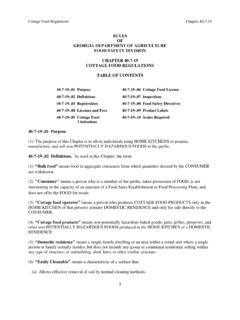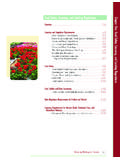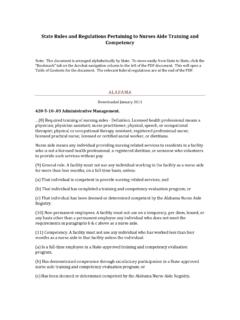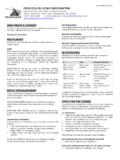Transcription of 2010 Laws, Regulations and Requirements …
1 Fire SafetyUndoubtedly the most important laws and Regulations are those that deal with Fire Safety and Evacuation of Buildings. These incorporate the Fire Service Act 1975, section 21A; Fire Safety and Evacuation of Buildings Regulations 1992; Building Act 1991 and Associated Documents; Building Regulations 1992; and Building Industry Authority Act (Approved Documents amended June 2001).The Fire Service considers the Homestay industry to represent a level of risk which supports the need for an evacuation scheme. They strongly recommend that, whether it is required by law or not, all Homestay facilities are fitted with smoke alarms and have a defined evacuation process which includes a suitable designated safe assembly area outside the present the minimum recommendations for homestays/B&B s that can accommodate five guests or less, are: An Evacuation Advice Card must be displayed in each bedroom (see page 5 of the free Fire Service booklet Fire and Emergency Evacuation for an example).
2 Smoke alarms in each guest bedroom, in each exit route, each public area, and at least one smoke alarm on each level in the house. The Fire Service prefers a hard-wired interconnected smoke alarm system but if battery smoke alarms are installed they should be tested weekly, inspected monthly, and batteries replaced every six months (unless ten-year batteries are installed) A minimum 2kg multi-purpose dry powder fire extinguisher should be located in or close to the kitchen to allow ready access in the event of a kitchen or other fire, plus a similar extinguisher on each upper floor landing. The kitchen should have a fire blanket located in close proximity in the event of a cooking fire (a fire blanket can also be used as protective cover for a person evacuating a burning building) A working torch beside every bed to assist egress in dark or smoke-filled rooms (power supply may be cut) A safe alternative means of egress should be provided for guests who occupy rooms on the upper floors of the the number of guests exceeds five then the building comes under section 21A (1) (c) of the Fire Service Act 1975 and unless it is sprinkler protected, is required to have an approved evacuation scheme which must be approved by the Fire Service, and which must provide for the safe and quick evacuation of family and household members, as well as guests.
3 For you to obtain approval for an evacuation scheme the Fire Service will require detection and early warning of fire. Details of the Requirements are to be found in Fire and Emergency Evacuation , and hosts should discuss Fire Safety measures with their local Fire Safety fire safety matters are to be found in Section C of the Building Act 1991, and these are dependent upon a range of variables. Hosts need to check with their local Council regarding compliance with Regulations pertaining to their own Innkeepers Act 1962 applies to all hosts who take paying guests. Basically this means that hosts are legally liable if guests property is lost or damaged (negligence or fault does not have to be proved); but hosts liability under the Law is restricted to a maximum of $300 per item or $1200 in aggregate unless guests can prove the hosts were negligent or acted wilfully, when it can be much more. It is not enough for hosts to merely advise the insurance company that they take paying guests.
4 They need to request that their liability under the Innkeepers Act 1962 be covered under their Public Liability Indemnity insurance. (It may be easier for hosts to do this with a Business or Commercial insurance cover as some domestic insurance companies cannot provide cover under the Innkeepers Act.) laws , Regulations and Requirements Affecting B&B ProvidersSome of the laws and Regulations which impact on home hosting are briefly described Press PO Box 6843, Wellington, New ZealandTel: +64-4-385 2615 Fax: +64-4-385 2694 email: web: 1 Public Liability Indemnity is a must, and hosts need to be insured under all sections to ensure they are covered for legal liability for third party property damage or bodily injury and also statutory liability covering innocent breaches of certain Acts such as ACC, Health & Safety in Employment, Resource Management Act, Building Act, Privacy Act, Fair Trading Act, and Consumer Guarantees Act, as well as for Fines and Legal Defence Costs, Exemplary and Punitive Damages, Social and Recreational Activities, Rural and Forest Fires, etc where of Swimming Pools Act 1987 Hosts need to know that they will be charged with manslaughter if a child drowns in their swimming (or spa) pool if it is not fenced in accordance with the building code specifications.
5 Any doors giving access from a building to the immediate pool area need to have child-proof locks, or top bolts on ranchsliders. Lockable spa pool covers are not allowed as an alternative to a proper pool fence. The host s Council can provide specific details. New swimming pool fences require a building Management Act 1991 and AmendmentsThe District Plan of each regional Council determines the number of guests that can be accommodated in a homestay without the need for a Resource Management Consent. You should consult your area s District Plan for the number in in your area. Homestays/B&B s intending to host more than this must apply for a Resource Management Act 1962 and AmendmentsYou may transport paying guests as long as you are NOT charging them for this service, otherwise you need a P endorsement on your of Liquor Amendment Act 1999A 1999 Amendment to the Sale of Liquor Act, under Section 5, Exemption for Homestays, allows hosts to serve or sell liquor to their guests up to a maximum of ten Act 1981 and Food Hygiene Regulations 1974 (Food Safety Programmes)In July 1997 an amendment to the Act allowed all food premises, including premises where food is prepared and sold or provided to paying guests to apply for an exemption from the Requirements of the food hygiene Regulations and to adopt, as part of the exemption process, a Food Safety Programme designed to identify and control food safety risk factors in order to establish and maintain food safety.
6 As yet most Councils do not have enough trained staff to monitor this Act, but sooner or later all B&B s will be under scrutiny. In anticipation of this many hosts have already completed a course for a Food Hygiene Certificate (courses available through most Polytechnics).Health and Safety in Employment Act 1992 (OSH)This law was enacted primarily to protect employees, but it also places responsibility on the self-employed, employers and employees to ensure their work doesn t harm other people ( paying guests at your farmstay or B&B). The Act says that all practicable steps should be taken to ensure people s safety. Identify the hazards on your property, do what you can to minimise or eliminate the dangers, and warn guests of the hazards either verbally or in writing (maybe in an Information Folder) or preferably, both. Always provide safety equipment where appropriate, riding helmets, life jackets, cycle Prevention Rehabilitation and Compensation Act 2001 This is the Act under which the ACC Guarantees Act 1993, Fair Trading Act 1986 Hosts should be aware of their obligations under these Acts, particularly with regard to any misrepresentation in their CompanyYou can arrange insurance through any insurance company or broker.
7 A d a m s Tr i m m e r I n s u r a n c e, P O B o x 1 1 4 4 Whangarei, Phone (09) 438 0245 Fax (09) 438 4524, has a special B&B package which we understand is information is provided by the publishers of The Bed & Breakfast Book as a guide and is not intended as qualified legal advice. You should consult a legal professional for legal advice. Moonshine Press 2003. This information was prepared by Lynlie Watson, Jacaranda Cottage, Katikati. Page 2 Moonshine Press PO Box 6843, Wellington, New ZealandTel: +64-4-385 2615 Fax: +64-4-385 2694 email: web: , Regulations and Requirements Affecting B&B Providers






